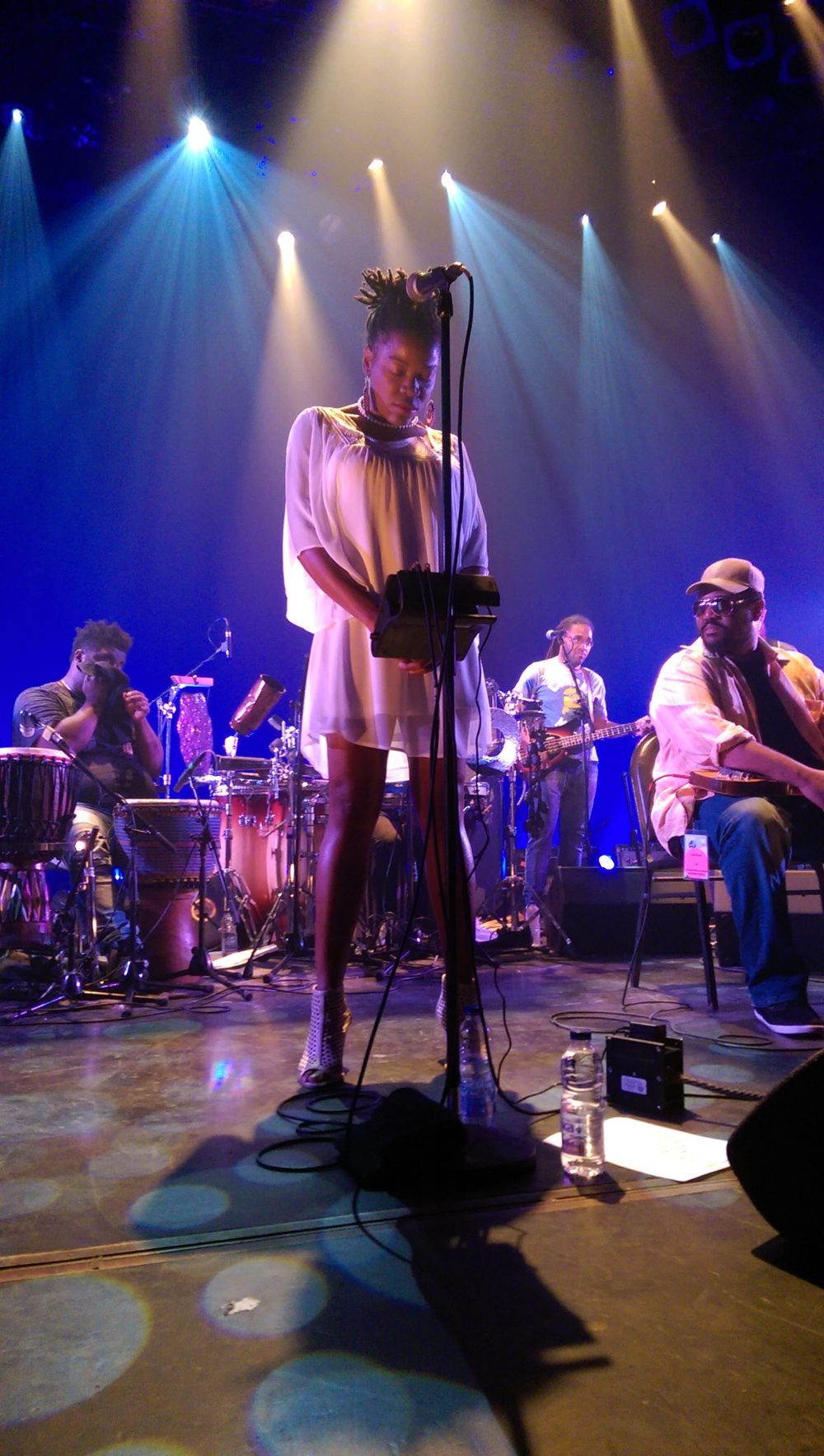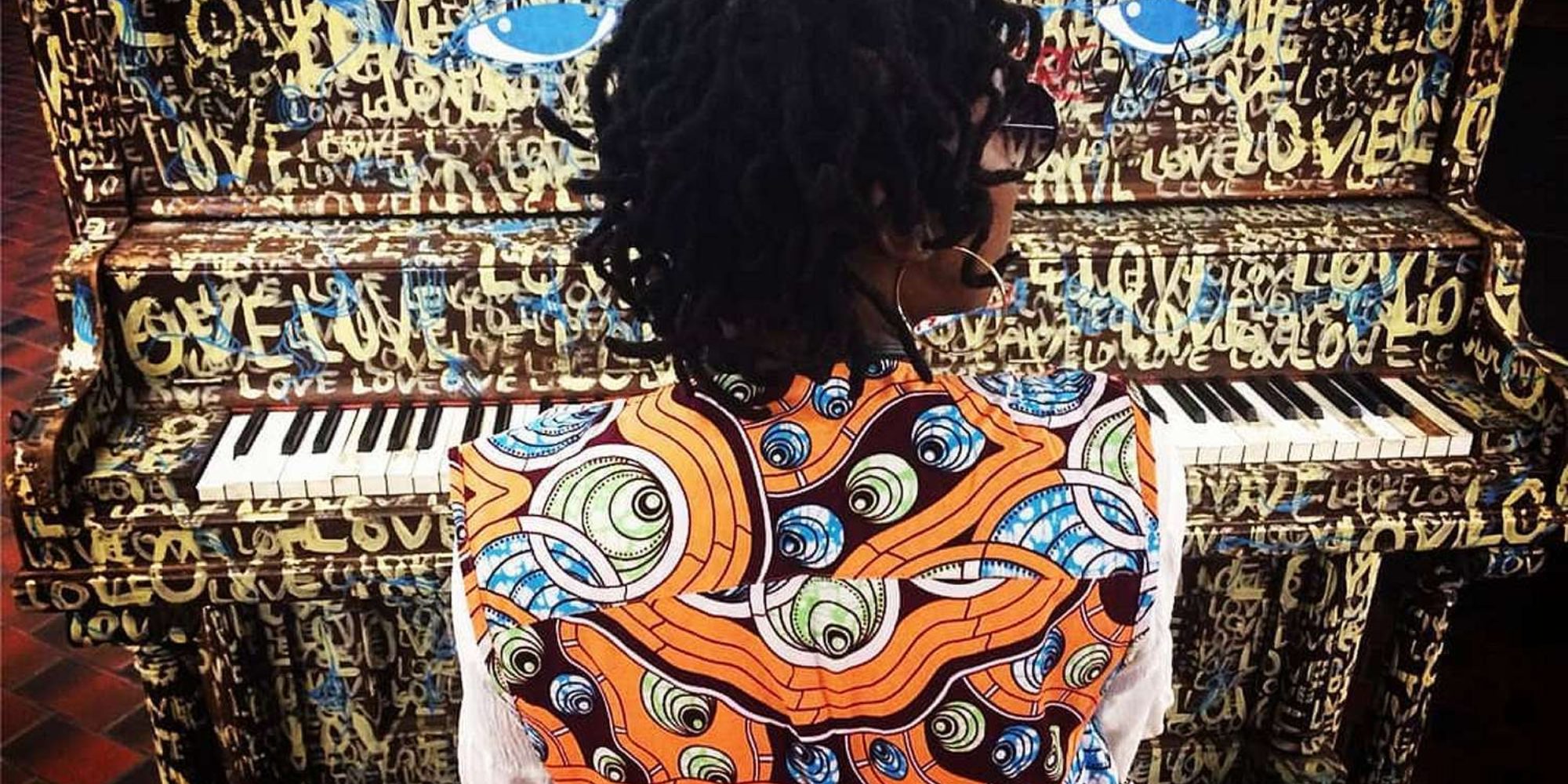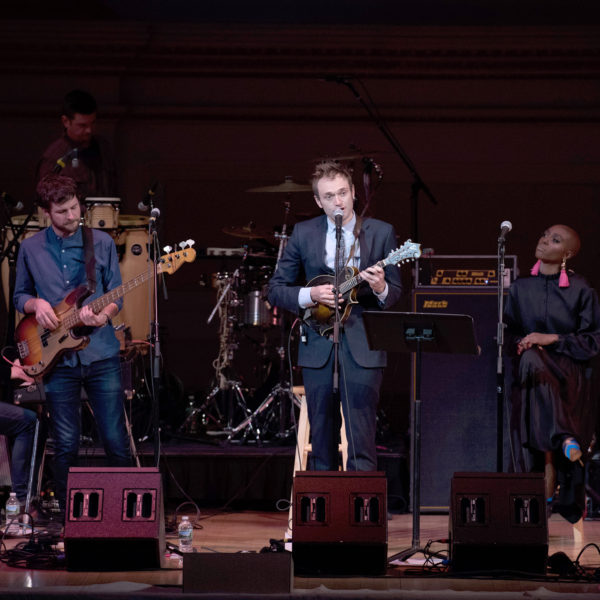Editors note: As we were preparing this article for print to coincide with Bokanté's North American tour in May, on Sat., May 12, the band unexpectedly announced they had to cancel the tour, literally 24 hours before the first show. They are hoping to reschedule the tour for the fall or winter, but those in Europe will still be able to catch them on their tour this summer. Photo above by Mark A. Haynes.
One of the most exciting albums to come out in 2017 was Bokanté's Strange Circles, a side project of the Grammy award-winning future-jazz group Snarky Puppy's leader Michael League. The name Bokanté means “exchange” in Creole, and the group, whose members come from around the globe, is very much a musical exchange of ideas. The lead vocalist, lyricist and co-songwriter of the band is Guadeloupe-born and raised Malika Tirolien. And while most people were first introduced to Tirolien's amazing vocalizations through an earlier Snarky Puppy project entitled Family Dinner, to which she contributed two songs, she has been an active member of Montreal's music scene for over a decade now.
Growing up on the French Caribbean island of Guadeloupe, Tirolien was enthralled with American soul and hip-hop music, but especially with Michael Jackson. She and her friends used to hang out during school recess and sing his songs, working out harmonies and dance moves. Her father, a history teacher, was also a self-taught multi-instrumentalist. When he saw she was interested in the piano, he signed her up for classical music lessons.
“I was a rebellious, but a good student in school,” Tirolien says. “I would piss off some of my teachers. When my dad saw that I was interested in the arts, he was really happy about it and pushed me, while maybe other people from the family were like: 'You should consider something that is going to actually bring you money.' I think he wanted to make sure my spirit could stay free. So I'm really grateful for my dad.”
At the age of 15, she went on a trip with her aunt and uncle, visiting cities along the northeastern parts of the United States and Canada. But of all the cities they visited, it was Montreal she fell in love with. “It's one of the best memories,” she recalls. “It was the summer, so there were all these festivals and everybody was so happy. I was like: 'O.K., I'm coming here to study.' And then I did.”
When Tirolien came to the University of Montreal to study music, she was surprised to learn there were no majors in hip-hop or soul music. “Though nowadays maybe you can find something, but then no,” she says. “It was classical or jazz. So I went and studied jazz because that's where all that other music comes from. I was still so excited because I was going to study music. Doing music all day, every day. It was very good for me because I was playing with a lot of people. You make connections and a lot of these connections I still have right now. It's beautiful for that. But then when I actually got my degree, it hit me that I had just learned some stuff, but like jazz was all supposed to be about to feel free, 'freedom music.' But me, I learned it the opposite way, as if it was about rules. I felt it was so weird.
“But it was only after my degree,” she continues, “that I thought about that. Because you're trying to learn all the vocabulary and the chords and everything, but then you read about the actual players and a lot of them couldn't read music. They were just playing what they felt. And then with school, you're only playing with your head because you're trying to apply some theory that you just learned and paid for. It was such a contrast. I felt like I had to forget all that stuff. 'Now,' I said, 'you've gone to school, you have a degree, and now you have to start feeling stuff again.'”

Between her studies, she was meeting local musicians and found herself singing with at least seven different bands. Even though she was so busy, she says, “Everything kind of hit at the same time. I was finished with school. I also finished with this relationship I was in. I was finished with everything. So I went to Paris. A lot of people from Guadeloupe go to France. All my best friends were there. It felt so great. Then I came back two months later feeling renewed and refreshed, you know? But that's the thing. I felt so great but then I realized I had nothing to do! I started to feel a little depressed, and that's when Kalmunity came into my life.”
The Kalmunity Vibe Collective, which just celebrated its 15th year in May, began with a small group of musicians looking to explore connections between hip-hop, jazz, soul, Afrobeat, rap and poetry. They have grown over the years to have seen over 100 musicians, singers, and rappers take part in their performances. Twice a week, in Montreal, a group of anywhere between four and 20 may appear on stage together. All the songs are completely improvised. It continues to be a workshop for performers to exercise, stretch, and develop their voices. On any given night, besides instrumental tunes, you can hear people singing or rapping in French, English, and a handful of other languages, as many of the performers are immigrants from countries ranging from Morocco to Haiti. And many have gone on to form their own bands, often birthed through the collective.
“When I first got to Kalmunity,” Tirolien says, “it was exactly the kind of freedom I was looking for that I didn't get in school. A place to experiment and feeling what you're going to do–going with your gut instead of with your head. So everything was there. I felt so happy when I found this and I immediately wanted to be a part of it.”
Around 2005, Tirolien began making several attempts to start her own band. “But the first great gig I had was in 2008 and that's when I really put the band together. We all went then to Guadeloupe for a big gig, opening for Steel Pulse. It was one of my highest moments still. After that, gigs started coming more and more.”
She also found herself as a member of Groundfood, formed with some members of the Kalmunity family. The band started to develop some heat, playing gigs in New York and elsewhere, but eventually disbanded in 2014.
But it was while singing with Groundfood, in 2011, she first came into contact with Snarky Puppy. “I'm a very groupie kind of person and a real fan of Snarky Puppy, for real,” she admits. “I find this band amazing. The first time I heard them was in this little place and I was like: 'O.K., what is going to happen?' And it blew my mind. Like I didn't understand what just happened. I became an instant fan, you know? It doesn't happen often when I go somewhere and I listen to a band and trying to buy their music right now, and that happened with Snarky Puppy. I wanted to hear them again as soon as possible.
“So the story goes,” she continues, “we were doing this little gig opening for Snarky Puppy in Montreal. Michael League heard me and came to me and said: 'Wow, this is really cool. I would like to call you maybe because we do a series with some singers in New York with Snarky Puppy. We invite you, you bring three songs of yours, and we're like the house band, and we back you up.' So I was like: 'Yeah, I would be so interested.' But I thought he's never going to call me. But he did. I was just playing it cool, and when I hung up I was screaming and so happy. I got to go to New York and be at the Rockwood Music Hall. And from that, then they invited me for the album.”
The album, Family Dinner (Vol. 1), was a major turning point for Tirolien, both personally and professionally. Recorded in 2013, it won a Grammy for the track “Something,” sung by Lalah Hathaway. League had asked the singers to bring their own material to record and Tirolien had two on the album: “I'm Not the One” which she sings in English and “Sew,” in Creole. She proudly mentions the video for “I'm Not the One,” has had over one million views on YouTube to date.
“Michael is like a visionary,” she says of League, “He's an excellent musician, producer. He has so many assets, you know? And, he's a genuinely good person too, very generous. So when you have that kind of person leading a team, he attracts good people, great musicians. And to be in an environment like that, it was so inspiring and enriching, with people like Lalah Hathaway. For me, it was like historic. I felt very lucky to be at that place, at that moment. It's what I had always wanted, to be able to work with people I admired, and to have a good environment to work. I mean, like, everything was there. Seriously, I was contemplating a lot, soaked in so much. Though I considered them so much further musically from me. But then with time,” she adds, “you realize, you know, we are all people.”
On the heels of the Family Dinner album, Tirolien released her first solo album in 2014, entitled Sur La Voie Ensoleillée.
“I had been working on that one for years,” she says, “basically all my life, you know? It took so long because of many circumstances, but I've learned that everything happens for a reason. I didn't meet the right people for a long time. You know, like I met these so-so producers who would promise me the world and not do anything. Or, they wanted to change me and make me like the little chick with the dress, put me in a girls' band, talking about silly stuff. It just didn't work out. So many times I wanted to put out an album, but it didn't happen. Yet I feel like everything is great because all of these times made me think more and more about my music. And I got into producing my own music because of that. I was so tired of waiting for somebody to help me, so I feel very lucky and fortunate because now I know I can do stuff by myself, though it's always better to do it with more people. But sometimes, just to start, it's good because it gives you the vision and the drive to be able to drive a team after. And also, if you have something, the right people will come to you.”
League came back to her in 2016, inviting her this time, not just to sing a couple of songs, but to front another of his side projects, which became Bokanté. In an interview in JazzTimes magazine last year, League said this about the project: “I’d been really into blues-based West African music since I was a kid. I’d just worked with Salif Keita and gotten really into Tinariwen and Bassekou Kouyate and Toumani Diabate and all these great Malian artists that have their own version of the blues. So I started listening to all of the material that was piling up on my phone and thought, 'I guess I just need to start a new band.' I think of it as a cross between West African music, Delta blues and the different paths that the blues have taken, like Zeppelin and basically all rock 'n' roll.
“[So,] the music is already a bastardization of different paths that the blues has gone down, and Malika, being from Guadeloupe, is speaking Creole, a language that was created out of the slave trade and traveled the same path that African music took. It just made sense [to ask her to be a part of it].”
League assembled a cast of musicians from different genres and backgrounds, starting with Chris McQueen and Bob Lanzetti from Snarky Puppy, three percussionists: Lebanese-American Jamey Haddad; Keita Ogawa from Japan; and the Swedish André Ferrari, and finally, to add another musical tradition into the mix, he invited sacred steel guitarist Roosevelt Collier.
“Right from beginning,” Tirolien says, “Michael had this idea. He was specific enough. He wanted a band to have a blues but also West African sound. He knew what kind of instruments he wanted, and he knew he wanted me to be the singer of the band, and to write some of the songs, but also all the lyrics. He wanted to touch on important topics, and asked me could I write on subjects like the religious wars happening, the condition of black people in the States, stuff like that. He gave me three or four topics for that album.”
That task was right up Tirolien's alley. Writing socially conscious lyrics had long been her passion. “I remember my first song when I was a teenager,” she recalls, “was about famine and how come we can let this happen. So I've always been socially conscious about writing. I always wanted to have content in my music, not just write about love. I wanted to write about different stuff. That's why I like Michael, because he has integrity and believes in stuff, and is not scared of being political in his things. He couldn't be that way with Snarky Puppy because it's an instrumental band.”
While Tirolien had first begun writing songs for herself in French, then, in Canada, she learned and began writing in English. But all that time, she often heard the lyrics in her head in her native Creole language. “Writing in Creole came much later for me,” she states, “but I'm glad it did. It's my culture and has been repressed so much. Even growing up, it was a sign of disrespect to speak in Creole to some members of my family. It's so f**ked up, if you think about it, you know? It's totally changing now. The tables are turning. But I'm really glad to see that change happen in me, and the desire to write in Creole. So when Bokanté happened it was weird, because I was thinking about doing a project myself being more oriented with the Creole and my roots.
“So on Strange Circles then, for example,” she continues, “'Jou Ké Ouvè,' is exactly on being open about other people's beliefs and not shutting them down just because they believe in something else than you. You know when you have that feeling that you're right about something, but no, there's space for everyone. In that song, Michael wanted me to write about the Islamophobia that's happening right now. So we worked like that for, like, four songs on the album.
“Another example is 'O La,' which I think is Michael's favorite song. It's the story of colonization. I wrote it as a story about a man who is lost in the forest and finds a house. The owner of the house invites him to spend the night and then go afterwards to find his way. But the guy falls in love with the house, and kills the owner so he can stay in the house. Then he builds walls around the house to protect it from people that will eventually do the same to him. And then someday people come knocking on his door. So that's the story of 'O La.' I was looking at what I could find metaphorically that could work, like maybe I could compare a country to a house, and that's how it came.”
The band is currently working on its second album, planned for release later this year. “It's more adventurous,” Tirolien says. “We're working with an orchestra too, the Metropole Orkest from the Netherlands. So it's huge. I have less space vocally and I had to be really specific in my melodies. It was harder to write this album, for sure. It's like we kind of know who we are now, but at the same time, it's so new with the orchestra, so it's something different from the first album. You have to leave space for the orchestra, but give a solid foundation enough for them. So how do you balance that and have a good lyrical content—good, but simple melodies to go with the intricate arrangements? It was very challenging. I feel it's a bit darker album this time also.
“In terms of what Michael asked of me on this album,” she continues, “he wanted, for example, a specific song on Donald Trump. So you can feel the environment happening in the States on the album. Also about social media and things like that. How the only information you get is the one that you want, or that they want to give you, so you don't have the whole aspect. You just get one side which is dividing the people a lot. So you don't get to have an argument because all you get for information is fuel for what you already believe in. So one of the songs on the album is about that—a chamber of echoes. You're in a room and everything you think or everything you say is just being replayed and replayed, and you cannot have another perspective.”
In between working on the new Bokanté album, she has started to work on her own second album which she hopes will be completed next year. She also continues to drop by to play with Kalmunity, as well as sing in a group led by Haitian-Canadian singer/MC Vox Sambou, and has been doing a Nina Simone tribute show, which she's performed now twice in Brazil and twice in Montreal.
It's a lot of work and a lot of fun, Tirolien says, and she's at a moment in her career where she's feeling very positive about it all. “Your life is what you make it,” she says. “I believe you are responsible for your own joy and your own happiness. It doesn't mean happiness is like fame or anything like that. A lot of people who are like that are actually miserable. So I'm really, really working hard on having a balance. Just focusing on being happy being myself, continuing to do things I love with people I love, and try to have as much integrity as I can. I'm just trying my best every time and surf the ups and downs, like everybody else.”












